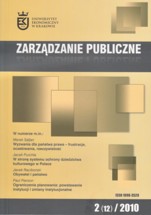Learning Mechanisms in Polish Ministries – the Results of an Empirical Study on the Learning Ministry (Ministerstwa Uczące Się, MUS)
Keywords:
system of organizational learning, knowledge useAbstract
Th e article presents the results of an empirical, exploratory study of organizational learning mechanisms in four polish ministries. In the analysis the authors applied a logic model of a system consisted to resources, processes and eff ects of learning. Th e results showed that Polish institutions had relatively good if highly fragmented resources, but their learning processes were weak and limited to operational use of knowledge. Th e main function of the system was not fulfi lled and stable connections between elements were absent. Th us, it has to be concluded that there is no learning system in Polish ministries. All we could observe was a collection of discrete elements, interactions and relations that could, in future, form an actual system. However, to make it happen, a critical mass and a binding factor would have to appear.



